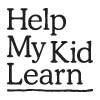What to do with this activity?
As tired parents, many of us are guilty of using the television (or its equivalent online) as a baby sitter to keep our children quiet and still for a while. But television can be a positive and active experience. Here are a few pointers:
As much as possible, try and watch television together with your child. That way you can chat about what you see, and ask questions, and add information.
Children can get bombarded with advertisements. Encourage your child to watch RTÉ Junior (or its player) or BBC CBeebies because they have no adverts.
Get lots of learning ideas from this video Literacy on the Television made by the "Literacy on the Loose" programme in Ireland. It's also a great idea to switch on the subtitles on the television or DVD that you are watching. It will help their reading and spelling skills.
-
Why am I doing this?
The written word is everywhere and by pointing out words around you everyday, your child will realise the usefulness of reading and how it brings information and knowledge of the wider world into your lives.
Reading together shows your child that you think reading is important. It helps your child to link the words on the page to how they are spoken and to begin to recognise words.
-
How can I do more?
Encourage your child to read by giving them books or information about what they are interested in, for example, if they are interested in cars, give them books about cars – it’s a great motivator. Use comics, magazines and newspapers to provide lots of new words and facts. Your child can use the pictures for information about the words they are reading.
Read longer books to your child. This will help with memory.
You could do ‘paired reading’ – your child chooses a book or comic to read.
- At first, both of you read aloud together. When the child is ready, they carry on reading alone.
- If they don’t know a word, you say it for them and both of you continue to read together until they are ready to read alone again.
- No pressure is made to get them to read by themselves. They only do it when they are ready. This is useful with older children when they find text books difficult.Your child might like to practise their reading skills by reading to younger children.
Discuss with your child’s teacher if they are having difficulty reading.
Rate this activity
How would you rate this activity?
1 = Poor, 5 = Great.



